

eLanguages.ac.uk - digital literacies toolkit. Welcome to the Digital Literacies Toolkit.
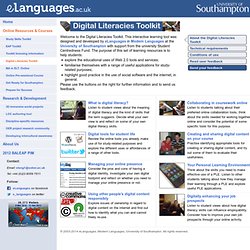
This interactive learning tool was designed and developed by eLanguages in Modern Languages at the University of Southampton with support from the university Student Centredness Fund. The purpose of this set of learning resources is to help students: explore the educational uses of Web 2.0 tools and services;familiarise themselves with a range of useful applications for study-related purposes;highlight good practice in the use of social software and the internet, in general. Please use the buttons on the right for further information and to send us feedback. Technical requirements Some of the activities in the toolkit resources require headphones or speakers.
Conditions of use If you are a student you may access and use these learning resources freely for the purpose of learning. The intellectual property rights in the Digital Literacies Toolkit shall at all times remain the property of the creators. User feedback Send us feedback. How The Best Web Tools Fit Into Bloom's Digital Taxonomy. There are some very popular tools and apps out there.
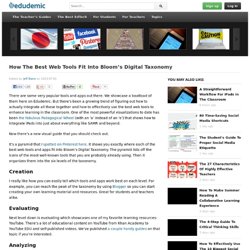
We showcase a boatload of them here on Edudemic. But there’s been a growing trend of figuring out how to actually integrate all these together and how to effectively use the best web tools to enhance learning in the classroom. One of the most powerful visualizations to date has been the fabulous Padagogical Wheel (with an ‘a’ instead of an ‘e’) that shows how to integrate iPads into just about everything like SAMR and beyond. Now there’s a new visual guide that you should check out. It’s a pyramid that I spotted on Pinterest here . Creation I really like how you can easily tell which tools and apps work best on each level. Mfortably 2.0: The Digital Citizenship Survival Kit. Information Literacy. Moira's InfoLit blog. Adapting PowerPoint Lectures for Online Delivery: Best Practices. January 7, 2013.
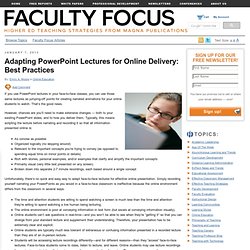
21st-century Scholarship and Wikipedia. Printer-friendly version Send to friend.
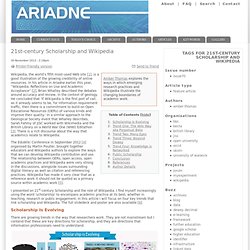
Groups > ILRead. Information literacy – long list of resources. Information literacy – long list of resources. Can the Digital Generation Do Anything Right? - Marketplace K-12. Open University Library Services. A literature review as collective and inner library. I recently mentioned in passing in this blog, in relation to writing book reviews in fact, the book by Pierre Bayard provocatively entitled How to talk about books you haven’t read (2007).
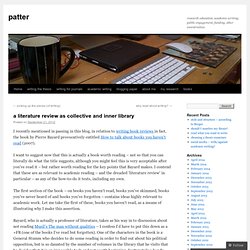
I want to suggest now that this is actually a book worth reading – not so that you can literally do what the title suggests, although you might feel this is very acceptable after you’ve read it – but rather worth reading for the key points that Bayard makes. How Google Impacts The Way Students Think. How Google Impacts The Way Students Think by Terry Heick It’s always revealing to watch learners research.
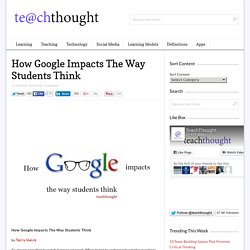
When trying to understand complex questions often as part of multi-step projects, they often simply “Google it.” Implementing ANCIL [licensed for non-commercial use only] / Introduction. E-Safety. Plagiarism. You have something in common with the smartest people in the world.

You see, everyone has ideas. We use our minds to create something original, whether it’s a poem, a drawing, a song, or a scientific paper. Some of the most important ideas are published and make it into books, journals, newspapers and trustworthy websites that become the building blocks for things we all learn. But ideas are also very personal, and we need dependable ways to keep track of the people behind the ideas we use because they deserve credit for their contribution, just as you do if someone uses your idea. Passing off another person’s ideas or words as your own, without credit, is called plagiarism. Meet Cassie, a university student. Coursera. IJ-SoTL: Current Issue: Volumn 6, Number 1 - January 2012.
S3 Home : s3. Library.wales.org: Social Bookmarking with students: Quality not quantity! Knowing how to organise, filter, research, evaluate and bookmark resources online is a valuable skill for students to gain.
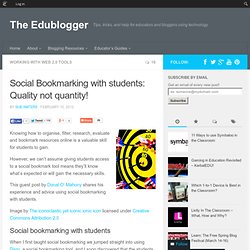
However, we can’t assume giving students access to a social bookmark tool means they’ll know what’s expected or will gain the necessary skills. This guest post by Donal O’ Mahony shares his experience and advice using social bookmarking with students. Image by The iconoclastic yet iconic ionic icon licensed under Creative Commons Attribution 2.0 Social bookmarking with students When I first taught social bookmarking we jumped straight into using Diigo, a social bookmarking tool, and I soon discovered that the students dumped links irrespective of their quality.
Library.wales.org: Information Literacy in the Workplace. Library.wales.org: Project. Research in Learning Technology. Resources Centre - learning and teaching resources from the Higher Education Academy. Developing digital literacies. Overview Many learners enter further and higher education lacking the skills needed to apply digital technologies to education. As 90% of new jobs will require excellent digital skills, improving digital literacy is an essential component of developing employable graduates. Courses that embed core digital skills, as well as subject specific use of technology, enable students to gain the skills and confidence they need to use digital technology not only to support their learning but also in the workplace. We’re working with colleges and universities to embed core digital skills into the curriculum. By digital literacy we mean those capabilities which fit an individual for living, learning and working in a digital society: for example, the skills to use digital tools to undertake academic research, writing and critical thinking; as part of personal development planning; and as a way of showcasing achievements.
Developing Digital Literacies programme.